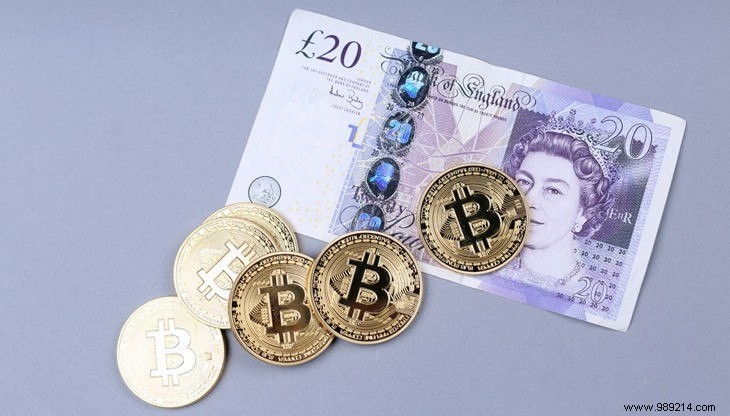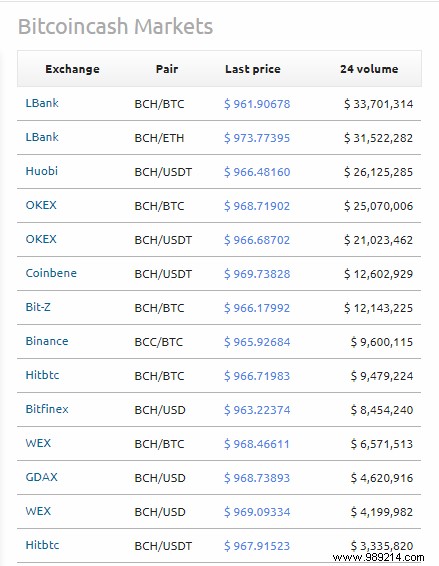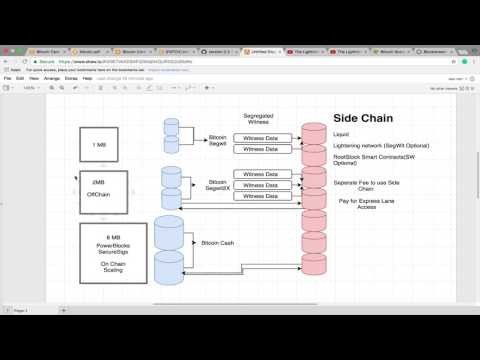Bitcoin still dominates the cryptocurrency space, but lately we have seen a series of high-level splits or forks. If you are interested in digital currency, you have probably noticed that Bitcoin Cash has been in the news since August 1, 2017. But what exactly is Bitcoin Cash? Before we dive into the heart of Bitcoin Cash, let's first touch on bitcoin to get beginners on board.
ContentsWhat is Bitcoin?Bitcoin Cash ExplainedHow to Buy Bitcoin Cash (BCH)Step 1:Get a Bitcoin Cash WalletStep 2:Find a Bitcoin Cash ExchangeStep 3:Transfer Bitcoin Cash to Your WalletIs It Possible to Exchange bitcoins versus bitcoin cash?Differences between bitcoin and bitcoin cashTo summarize

Bitcoin Cash is the continuation of the Bitcoin project as a peer-to-peer digital currency. To better understand Bitcoin Cash, you must first understand what a blockchain is. Bitcoins operate on an open transaction ledger called "Blockchain". The blockchain is a shared public ledger where all transaction data on the network is recorded. Every time a user initiates a new transaction, that transaction is recorded and verified using blockchains.
Bitcoin Cash is a forced fork of Bitcoin. A fork is a digital currency software modification that splits an existing blockchain into two separate versions. Bitcoin Cash is therefore the product of a forced fork that split the Bitcoin blockchain on August 1, 2017. And just like the original Bitcoin, Bitcoin Cash is fully decentralized without a central bank and is independent of any geographic entity.
A small group of miners dissatisfied with Bitcoin's limitations and lack of updates decided to take matters into their own hands. By forcing a fork in the Bitcoin blockchain, they created a new currency known as Bitcoin Cash. The problem with hard forks is that if some people don't agree with the original group's ideologies, they are free to break away and launch their own version with the same technology but governance model and strategies. different. This is what happened to Bitcoin.
You can buy Bitcoin Cash (BCH) much like other cryptocurrencies. Here are the three simple steps to follow.
Before you can buy BCH, you will need a wallet that supports Bitcoin Cash to store it. Recently, major wallet builders have embraced Bitcoin Cash, and more are embracing it. Hardware wallets that support BCH include industry leaders such as Trezor and Ledger. Both offer the ability to trade with BCH as you would with other currencies. You can see all other wallets that support BCH on the official Bitcoin Cash website.
Since Bitcoin Cash is still new, its exchanges are not as numerous as Bitcoin exchanges. However, there are few reputable Bitcoin Cash exchanges you can work with.

Coinbase, the most popular Bitcoin exchange, recently added support for Bitcoin Cash. Coinfloor is another great option for UK traders as it is based in London. You can see all available exchanges for BCH on the official Bitcoin Cash website.
Although optional, it is wise not to leave any money on a trade. Once you are done buying your BCH, be sure to move it to your Bitcoin Cash wallet, then check the status of your transaction using the Bitcoin Cash Block Explorer button. The transaction will be completed once you have received three confirmations for your Bitcoin Cash.
If you own Bitcoins (BTC), it is possible to exchange them for Bitcoin Cash (BCH). All you have to do is find an exchange that supports Bitcoin Cash and follow its guidelines for BTC/BCH trading.
At the time of writing, HitBTC's official BTC/BCH rate is 8.7386.
You may also want to claim your Bitcoin Cash (BCH) and sell it for Bitcoin (BTC)
To sell your Bitcoin Cash on an exchange, you will need to choose between the three exchanges that currently accept Bitcoin Cash deposits:Bittrex, ViaBTC, and HitBTC. Most people opt for HitBTC because their registration process is quick and easy. Additionally, HitBTC only requires two confirmations for the deposited Bitcoin Cash to be credited to your account and made available for trading.

Bitcoin Cash is essentially a fork of the original Bitcoin blockchain ledger. Even though it is a continuation of the original Bitcoin Project, Bitcoin Cash features improved consensus rules that allow it to grow and grow. The main difference between the two cryptocurrencies is in the block size. While Bitcoin offers a block size of one megabyte, Bitcoin Cash provides a larger block size of eight megabytes.
A block refers to a group of verified transactions. With a block size limit of one megabyte, the Bitcoin blockchain is limited to a maximum of seven transactions per second. With Bitcoin, periods of high activity and increased usage often lead to network congestion, causing transactions to take a considerably longer period of time. This also results in higher transaction fees.
On the other hand, Bitcoin Cash has blocks increased up to eight megabytes, which in theory speeds up the transaction process. The high number of transactions on the network contributes to the reduction of transaction fees in the Bitcoin Cash blockchain.
With the increased block size, Bitcoin Cash can allow the processing of around two million transactions per day, compared to Bitcoin which provides up to 250,000 transactions per day. The other notable difference is that Bitcoin Cash offers replay and erasure protection.
In general, Bitcoin and Bitcoin Cash do not differ much apart from transaction potential. While Bitcoin, for now, enjoys a larger market share, Bitcoin Cash has positioned itself as a cryptocurrency focused on transaction capacity. One advantage that Bitcoin Cash enjoys over the original Bitcoin is that the greater transaction processing power means lower fees and faster payouts.
Feel free to comment and share.